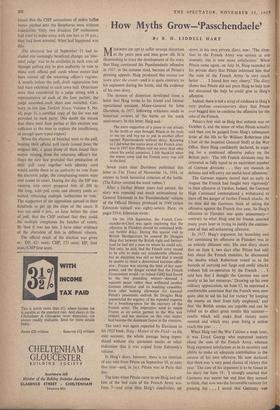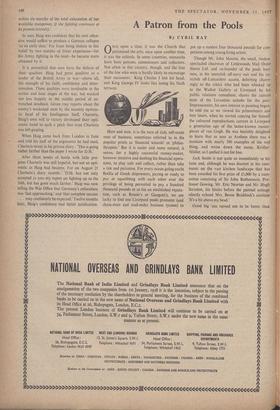How Myths Grow Tasschendaele'
By B. H. LIDDELL HART MEMORTES are apt to suffer strange distortion as the years pass and men grow old. It is illuminating to trace the development of the story that Haig continued his Passchendaele offensive in 1917, in the autumn mud, because of Main's pressing appeals. Haig produced this excuse ten years after the event—and it is quite contrary to his argument during the battle, and the evidence of his own diary.
The process of distortion developed from a
letter that Haig wrote to his friend and former operational assistant, Major-General Sir John Davidson, in 1927, following criticisms made in historical reviews of the battle on the tenth anniversary. In this letter, Haig said : The mere suggestion of a pause in our attacks in the north at once brought Main in his train to see me and beg me to put in another effort against Passchendaele without delay. Knowing as I did what the rotten state of the French army was in 1917 (for Petain told me more than once about his awful anxieties), I.felt thankful when the winter came and the French army was still in the field.
Seven years later Davidson published this letter in The Times of November 14, 1934, in answer to fresh historical criticism of the battle. (The Editor omitted the word `rotten.')
After a further fifteen years had passed, the story was repeated and much embroidered by General Edmonds in his `Passchendaele' volume of the Official History produced in 1949 (when
Edmonds himself was eighty-seven). Here, on pages 235-6, Edmonds wrote :
On the 19th September, the French Com- mander-in-Chief was again imploring that the offensive in Flanders should be continued with- out further delay. During this special visit to British Headquarters he assured Sir Douglas Haig that between the British right and Switzer- land he had not a man on whom he could rely. Not only, he said, had the French army ceased to be able to inake any considerable offensive, but its discipline was still so bad that it would be unable to resist a determined German offen- sive: France was nearing the limit of her man- power, and the danger existed that the French Government would—as indeed GHQ had feared in the two preceding winters—demand a separate peace rather than withstand another German offensive and its resulting casualties. Even after making allowance for General Petain's pessimistic outlook Sir Douglas Haig appreciated the urgency of his repeated requests for a breathing-space for the recovery of the French army. The imperative need to retain France as an active partner in the War was evident, and her decision on this vital mattcr.
, had become the dominant factor in the situation.
The story was again repeated by Davidson in his 1953 book, Haig : Master of the Field—as his own account, the whole passage being repro- duced without any quotation Marks or other indication that it was copied from Edmonds's volume.
In Haig's diary, however, there is no mention of any visit from Pdtain on September 19, or near that time—and, in fact, Main was in Paris that day.
The time when Main came to see Haig and tell him of the bad state of the French Army was June 7—and even then Haig's conclusion, set down in his own private diary, was : 'The situa- tion in the French Army was serious at one moment, but is now more satisfactory.' When Main came again, on July 16, Haig recorded in his private diary that Main informed him that the state of the French Army 'is very much better . . . I found him very cheery.' The diary shows that Pdtain did not press Haig to help him but discussed the help he could give to Haig's offensive.
Indeed, there is not a scrap of evidence in Haig's very profuse contemporary diary that Pdtain ever begged him to continue the offensive for the sake of the French.
Petain's first visit to Haig that autumn was on October 6, and the tenor of what Main actually said then can be gauged from Haig's subsequent letter of the 8th to Sir William Robertson (the Chief of the Imperial General Staff) at the War Office. Here Haig confidently declared, in argu- ing for a continued offensive policy on the British part: 'The 100 French divisions may be ' estimated as fully equal to an- equivalent number of German divisions . . ..they are staunch in defence and will carry out useful local offensives.'
The German reports record that as early as August 'the French had fought very vigorously' in their offensive at Verdun. Indeed, the German High Command contemplated a withdrawal to stave off the danger of further French attacks. At no time did the Germans think of taking the offensive against the French that year. So Haig's offensive in Flanders was quite unnecessary— contrary to what Haig and his friends asserted many years later in trying to justify the continu- ance of that self-exhausting offensive.
In 1917, Haig's argument for launching and for continuing his offensive in Flanders was in an entirely different vein. His own diary shows that on June 9, two days after Pdtain had told him about the French mutinies, he discounted the doubts which Robertson raised as to the hazards of carrying out large and costly attacks without full co-operation by the French . . . I told him that I thought the German was now nearly at his last resources.' Drawing up his own military appreciation, on June 12, he expressed a comfortable assurance that the French were now quite able to aid his bid for victory 'by keeping the enemy on their front fully employed,' and that 'the British armies are capable and can be relied on to effect great results this summer— results which will make final victory more assured and which may even bring it within reach this year. . .
When Haig. met the War Cabinet a week later, it was Lloyd Georg 9 who expressed anxiety about the state of the French Army, whereas Haig expressed satisfaction as to its recovery and ability to make an adequate contribution to the success of his own offensive. He now declared that there was 'a very good chance of victory this year.' The core of his argument is to be found in his diary for June 19: 'I strongly asserted that Germany was nearer her end than they seemed to think, that now was the favourable moment for pressing her . . . I stated that Germany was within six months of the total exhaustion of her available manpower, if the fighting continues at its present intensity.'
In sum, Haig was confident that his own offen- sive would suffice to produce a German collapse 'at an early date.' Far from being shaken in this belief by two months of bitter experience—for his Army, fighting in the mud—he became more obsessed by it.
It is proverbial that men have the defects of their qualities. Haig had ,great qualities as a leader of the British Army in war—above all, the strength of his faith, confidence and deter- mination. These qualities were invaluable in the earlier and later stages of the war, but worked out less happily in the middle period of en- trenched deadlock. Given rosy reports about the enemy's weakened state by the innately optimis- tic head of his Intelligence Staff, Charteris, Haig's .own will to victory developed their opti- mistic trend to such a pitch that even Charteris was left gasping.
When Haig came back from London in June and told his staff of the arguments he had used, Charteris wrote in his private diary : 'This is going rather farther than the paper I wrote for D.H.'
After three weeks of battle with little pro- gress Charteris was still hopeful, but not so opti- mistic as Haig had become. For on August 21 Charteris's diary records : D.H. has not only accepted in toto my report on fighting up to the 16th, but has gone much farther.' Haig was now Idling the War Office that Germany's exhaustion was 'fast approaching,' and 'that complete success . . . may confidently be expected.' Twelve-months later, Haig's confidence had better justification.



































 Previous page
Previous page